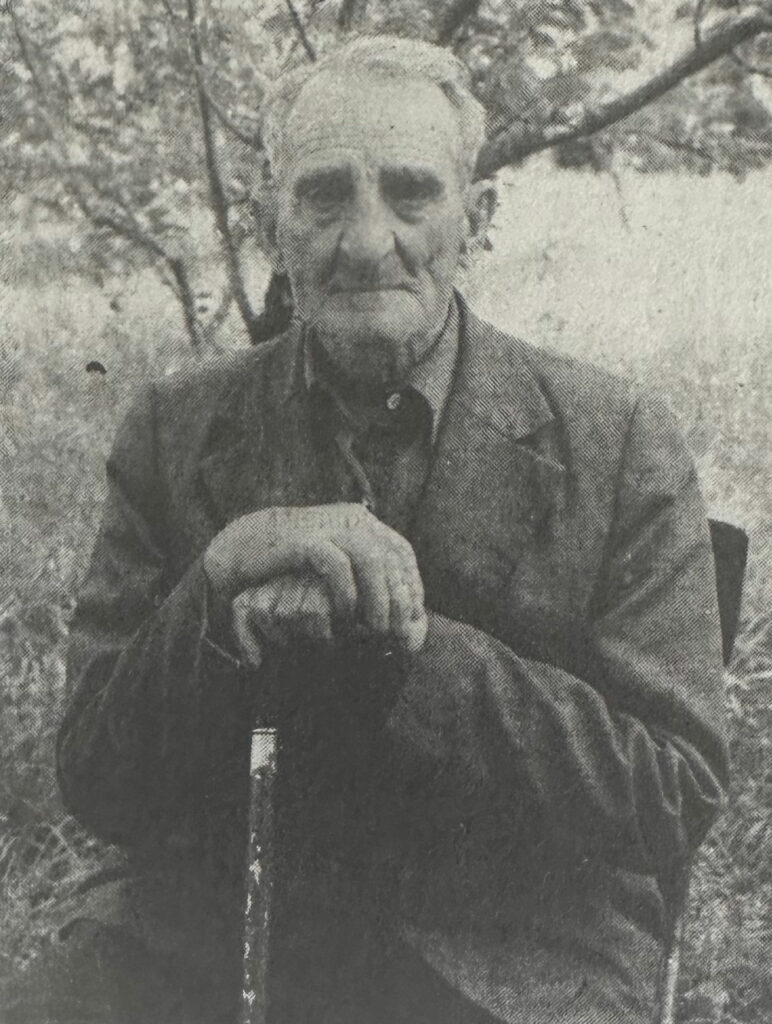I was born in the village of Tartakiv in 1911. There were seven of us in the family, and I was the youngest. My father fought on the Austrian-Russian front. Later he got typhus and died.
I loved to work the land, it was a joy to reap the fruits of my labor, and classes at Prosvita and teaching History of Ukraine and religion there are one of my fondest youthful memories. Dr. Petro Sanotskyi taught us young people, and I was already in my twenties. From him, we learned about events in the world and tried to analyze the socialist path of Russia’s development.
Brother Peter was one of the first to realize both the good and the freedom that the Soviet regime brought in 1939, and he began to hide.
So I think I was arrested because of my brother. It was spring 1941, and we were preparing for sowing.
The NKVD authorities, as soon as they arrived, immediately had data on everyone and everything, and compiled lists of unreliable people. Soon there were raids and arrests…
I was already married, we had two children. They came to our house at four in the morning, woke everyone up, scared them. The eldest of those “guests” gave instructions and laughed defiantly: “We are not scary for good people, but only for bad people.”
They gave us half an hour to get ready, but it was just minutes. Everyone was fussing, the “guests” were shouting and pushing.
My heart was pounding in my chest, I almost jumped out, we did not know what would happen next, but with God and hope I took the image of the Mother of God from the wall, some belongings, rags, prayed, put my wife, two sisters, crying children on the wagon, and off we went – we were taken to Stoyanov, to the station.
It was hard to leave our home, farm, and cattle… On the same day, the Mandryk family was also taken away, as were the unfortunates from Spasiv and other villages.
I’ll say a few words about my mother, who was already eighty years old at the time. Some unknown political officer advised her to hide, which she did, and she was not taken with us, but later she had to be arrested in Lviv.
Most likely, we suffered for Petro, who was fighting for a free Ukraine. Later we received the news that at the turn of 1944-45 he and his friend were killed near the village of Romanivka.
Those were the times, and my family and I still had a long way to go to the East
We were herded into wagons like cattle and taken under guard all the way to Moscow. Men, women, and children traveled together, “accommodated” on bunk beds. Up to forty families were traveling in a sealed railroad car. In Moscow, they kept us impoverished for two more days, decided where to take us, and finally, a painfully long two weeks of travel to the East. We stopped once a day for a snack, and we never knew how the “balanda” we were given was cooked. And small children like me needed other food.
I fondly remember one Tatar (Mamai, we called him), who gave the children food because he understood that we were all innocent.
But our eleven-month-old daughter still died, it was a terrible blow for my wife and me
“We were taken to the Tashkent region, to the Pakht-Aral state farm, a branch of the Comintern. It was very hot and hard labor. We worked on cotton (we called it “cotton wool”), and the hoes were heavy and uncomfortable. And it was unusual to work on irrigated land, often we even made water dams out of our own bodies.
And so on every day. And at night we wrapped ourselves in wet sheets to somehow escape the stuffiness.
Hunger was our constant companion. A kilogram of corn cost 100 rubles.
I stayed there until 1943, then many men were mobilized into the labor army, they did not want to take them to the front.
We worked in the same Tashkent region for 11 months on the construction of a bridge. I did different jobs, and it was a little easier as a construction worker than in the field. When they saw that I was good at all the jobs, they took me to the railroad in the mining town of Prokofievsk. I spent the whole day at the railroad, and at night I was still shoemaking, hemming boots. I slept in such a shack that when I got up early, I had a mouthful of coal dust.
It’s hard to put it into words, I can’t imagine how I managed to survive there.
Pavlo Kuziy from Spasiv
“I stayed in Prokofievsk until 1957, it was dangerous, there were frequent accidents. In the same year, I returned to my family in the Tashkent region. I had to stay there until 1966.
We received permission to return to Sokal only in the mid-sixties. The road home was difficult, but I am glad that the time has finally come to tell about all our ordeals, to show our innocence, our pain, and tragedy.
Pavlo Kuziy. Sokal.
newspaper Vpered – Voice from across the Bug, 1990

